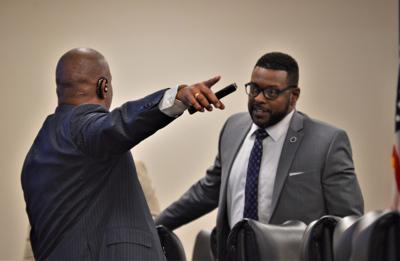COLUMBIA — South Carolina lawmakers are weighing legislation to place restrictions on where people can film the police before being charged with obstruction of justice.
Called the "HALO Act," the bill would create a 12-foot perimeter around law enforcement where bystanders would be prevented from filming officer interactions with the public when conducting an arrest.
The bill's sponsor, former chaplain for the Columbia Police Department and Democratic state Rep. Ivory Torrey Thigpen, told lawmakers he has been at incidents where questions arose over whether individuals were putting themselves or officers in danger.
"We do know that this technology is not going away, and incidents of it are increasing," he said. "I think it's an opportunity for us to be proactive and address what I believe is a concern not only for law enforcement and their safety but also concern for individuals and their First Amendment right to record."
The measure has bipartisan support, counting two Republican sponsors and the chair of the S.C. Legislative Black Caucus among its list of mainly Democratic backers.
But critics, including Democrats in Thigpen's own party, say the bill likely impedes on the public's First Amendment rights and could provide law enforcement additional tools to not only cover up misconduct but also imprison those who document it.
During a Feb. 23 hearing on the bill, Rep. Cezar McKnight, D-Kingstree, played cellphone video of two infamous killings of Black men by police: the 2020 death of George Floyd in Minneapolis and the fatal 2015 shooting of Walter Scott by a North Charleston police officer.
If the bill were enacted, he said, law enforcement would not only have the legal ability to charge the individual who recorded Floyd's death — which was filmed at close range — but have avenues to potentially abuse the law by charging individuals who filmed from farther away, like Scott videographer Feidin Santana.
"A 12-foot halo allows this man to die screaming for his mother the way he did and no one would know," McKnight said of Floyd. "A 12-foot halo allows (police officer) Derek Chauvin to be on the streets of Minneapolis abusing people."
"I am not at all going to suggest that law enforcement purposefully does this," he added. "These are rogue actors. Most of law enforcement in this country and in the state are fine people. Good folks. But we don't need another tool that will allow rogue elements to do what it is they want to do."
Numerous cities and states have considered similar legislation.
In Miami Beach, Fla., in 2021, the City Council enacted an ordinance that allowed for the arrest of people who impeded the police, only for it to be used primarily against Black men and women who recorded them, according to The Miami Herald.
A more extreme 100-foot limit was attempted in Texas in 2015 to the chagrin of free-speech advocates, while Arizona is currently contemplating its own form of "halo" legislation.
In South Carolina, proponents of the First Amendment believe the HALO Act could not just chill the rights of bystanders but also of the working press.
"It's highly concerning that we're considering legislation which would take court-recognized, expressive conduct covered under the First Amendment and make it something subject to criminal punishment," said Taylor Smith, an attorney for the S.C. Press Association.
Smith said the ambiguous language of the bill also leaves significant potential for the law to be abused. Under current law, police officers do not need to issue a warning before conducting an arrest. They would not need to under the HALO Act, either.
Rather than strengthening protections for officers, state lawmaker and Santana attorney Todd Rutherford, D-Columbia, said police officers could potentially use the law as pretense to seize, and then destroy, the evidence of potential misconduct.
"If you try and interfere it's called obstruction of justice. It's already a crime," Rutherford said. "What we don't need to do is make it so that within a 12-foot range you would be arrested for filming the act of a police officer. What would happen is that 12 feet become some arbitrary number that nobody knows exactly where it is. The phone gets taken, the video gets deleted and the officer moves on."
He asked lawmakers to let the bill die "a miserable death and that nobody amends it at all. It's not worthy of being amended, to be quite honest with you."
It is unclear when the bill will be up for a vote.











